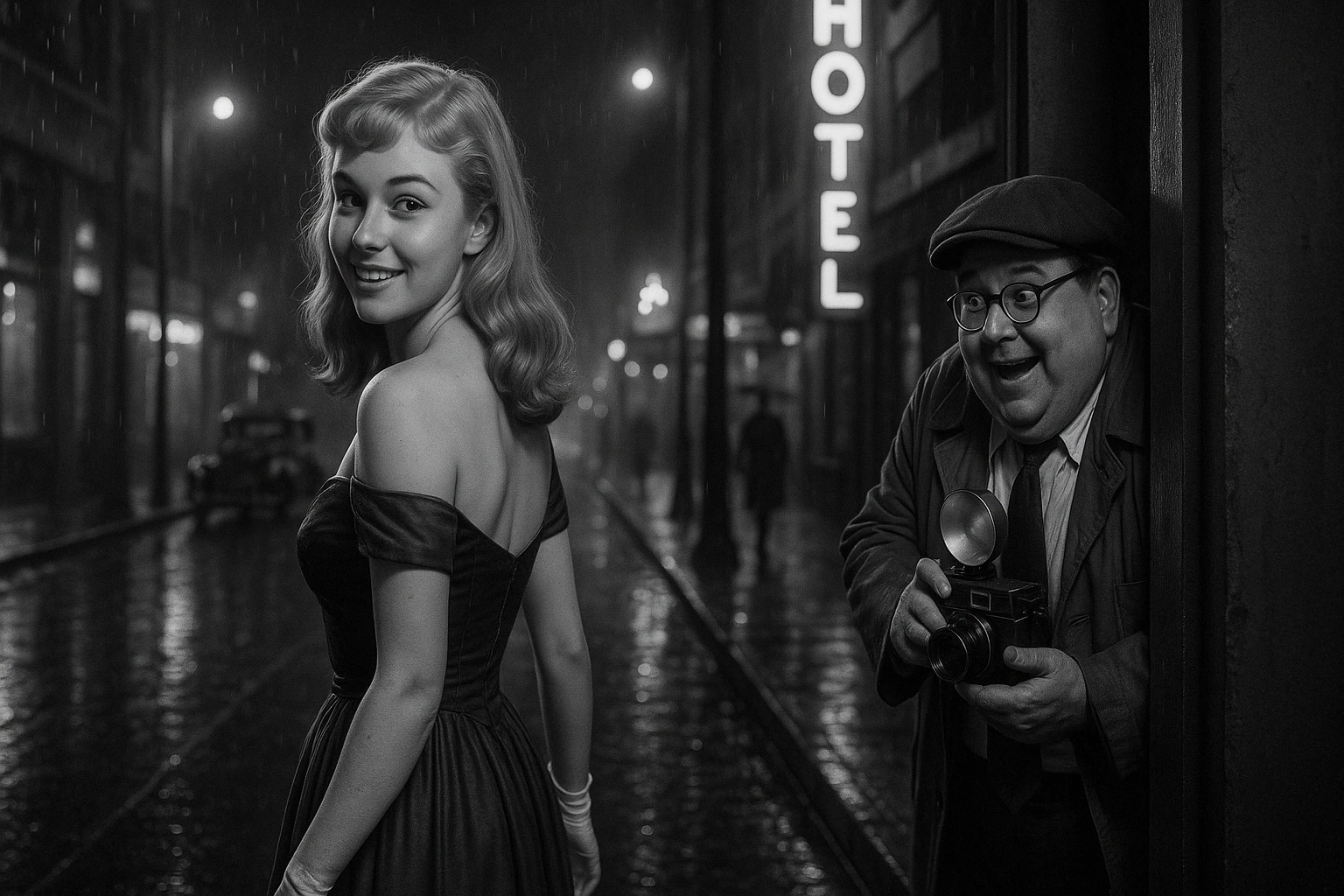Betting on Howard Hughes
(by Jaron Summers © 2025)
By 1945, Hollywood spun like a roulette wheel — minting movie stars, scandals, and assorted grifters.
Billy Woodfield (all 325 pounds of him) padded into Look magazine’s LA office, hunting for his next hustle.
Back then, America was lousy with legends: cowboys, gangsters, war heroes. But nobody loomed larger — or loopier — than Howard Hughes.
Hughes sat atop a mountain of cash, courtesy of his father’s invention: a drill bit so tough it could chew through the Earth’s bones. Howard, being Howard, burned through it on airplanes, actresses, and aviation fever dreams.
Billy had caught a whiff of a story: Hughes bragged he’d dated a young starlet named Mitzi Gaynor. Billy checked it out. Solid gold.
Back then, Mitzi — real name Francesca Marlene de Czanyi von Gerber (good luck fitting that on a marquee) — was just a teenager from Chicago with a stage mom made of iron and caffeine. She hadn’t yet belted her way into South Pacific — she had already caught Howard’s wandering eye.
Billy pitched Look the bones of his story, here are his crib notes:
Hughes invites Mitzi and her mother to a midnight dinner. A limo swoops them to his private airfield.
Blindfolds are handed out — “For the surprise,” Hughes grins.
Next thing they know, they’re strapped into a Lockheed Constellation thundering into the night sky. Fifty empty seats. Two bewildered souls and a rascal who would become a billionaire.
Soft music drifts through the cabin as Hughes pilots them God-knows-where.
They land — rough, wild gravel underfoot.
The aoma of bacon and eggs cuts through the chill.
Hughes seats his guests and orders, “Remove your blindfolds.”
Mom and daughter peel off their blinders to find themselves perched on the lip of the Grand Canyon — a sunrise flaming the cliffs, a breakfast banquet fit for royalty sprawled before them.
Look’s editors practically tackle Billy for the rights.
Problem: he’s got the outline, not the full script.
He buys 48 hours.
Just enough time to bribe Hollywood’s backlot hangers-on and stitch together the details.
Billy knows the risk: printing a story about Howard Hughes without approval could turn into a lawsuit that lasted until the next ice age.
Billy does the smart thing: He calls Noah Dietrich, Hughes’ bulldog business manager.
“Got a story about Howard,” Billy says. “Won’t publish without your OK. Look wants it.”
Thirty minutes later, a motorcycle screeches to a halt outside Billy’s place and scoops up the fat man’s prose.
At 4 P.M., his phone rings.
Dietrich’s voice: “Howard liked it. He wants to meet.”
Midnight. Hollywood Sign.
At 11:45 P.M., Billy’s dusty old Ford crunches to a stop near the iconic letters. A black limo purrs up.
Out steps Dietrich.
Billy rolls down his window.
Dietrich leans in: “Mr. Hughes loved your story — but he’d prefer it disappear. He’ll be… grateful.”
Billy rips up what he says is the only copy of Hughes’ late dinner date and passes the pieces to Dietrich.
In the limo’s backseat, Howard Hughes — shadowed, distant — nods once. Smiles.
They don’t speak.
They don’t have to.
Next morning Billy’s phone buzzes again.
Republic Pictures on the line.
The president wants a meeting. Now.
Billy throws on his best suit (well, close enough) and races over.
Inside an office that smells like cigars and three-picture deals, they offer Billy a job — a real one. Enough money to buy his mom a new coat, a Cadillac, and maybe a bungalow in Glendale.
Just like that, Billy was in.
Within weeks, he was on a first-name basis with Mitzi Gaynor, Cary Grant, Marilyn Monroe, Audrey Hepburn, and Sinatra himself.
In Hollywood, it’s not what you know.
It’s who you can make smile in a blacked-out limo at midnight.
